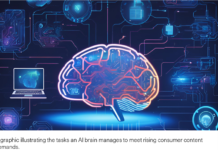Introduction
In today’s rapidly evolving technological landscape, algorithms play a crucial role in the development and function of artificial intelligence (AI). These step-by-step procedures enable machines to analyze vast amounts of data, learn from it, and make decisions that were once thought to be exclusive to human intelligence. As the backbone of AI systems, algorithms not only drive innovation across various sectors—such as healthcare, finance, and marketing—but also transform raw data into actionable insights. However, the increasing reliance on algorithms brings about significant ethical considerations, including bias and transparency challenges, necessitating careful design and implementation. As we continue to explore the potential of AI, understanding the importance of algorithms and their implications will be vital for fostering responsible development and ensuring fair outcomes.
Algorithms shape AI’s landscape. The existence of algorithms in the era of artificial intelligence (AI) is a pivotal aspect that shapes the landscape of technology and innovation today. Algorithms, which are essentially step-by-step procedures or formulas for solving problems, have become the backbone of AI systems. They enable machines to process vast amounts of data, learn from it, and make decisions that were previously thought to be exclusive to human intelligence. In this age, algorithms are not just tools; they are fundamental to the functioning of AI, driving advancements across various sectors. Game-changing algorithms like Google’s RankBrain and Facebook’s EdgeRank enhance our daily online experiences by personalizing content and improving search results. Apple’s Brotli compression algorithm optimizes web performance, making browsing faster and more efficient.

Transforming data into actionable insights.With the exponential growth of data generation, algorithms play a crucial role in extracting meaningful insights from this information. Data is often referred to as the new oil, and algorithms are the refineries that transform raw data into actionable knowledge. In areas such as healthcare, finance, and marketing, algorithms analyze patterns and trends, allowing organizations to make informed decisions that enhance efficiency and effectiveness. This capability to sift through and interpret large datasets has made algorithms indispensable in leveraging AI technologies.
The significance of computer programs lies in the algorithms that effectively execute designated tasks. In the realm of computing, algorithms function like powerful machines, enabling greater productivity in shorter timeframes. Notable examples include Google’s RankBrain algorithm, Apple’s Brotli, Facebook’s EdgeRank, and MarConPra AI marketer’s Pasyo and Contyo. These influential algorithms play a crucial role in maintaining the seamless operation of the intricate systems that comprise the digital landscape.
Gaurav Sharma, Inventor and Founder – MarConPra.
Machine Learning Evolution. Moreover, the evolution of algorithms has been significantly influenced by machine learning, a subset of AI that focuses on the development of systems that can learn from and adapt to new data. Machine learning algorithms, such as neural networks and decision trees, have revolutionized how computers perform tasks. These algorithms improve their performance over time as they are exposed to more data, leading to more accurate predictions and insights. The integration of these advanced algorithms into AI applications has led to groundbreaking innovations, such as autonomous vehicles and intelligent personal assistants.
Ethical concerns in AI algorithm usage. However, the reliance on algorithms in AI also raises ethical concerns and challenges. Issues related to bias, transparency, and accountability have come to the forefront as algorithms influence critical areas like criminal justice, hiring practices, and lending decisions. Regardless of the circumstances on the client side or the market’s offerings, the Contyo algorithm remains steadfast in its principles. With its intelligent design, Contyo manages the situation effectively and secures interests through ethical practices. The potential for algorithms to perpetuate existing biases or make opaque decisions necessitates a careful examination of how they are designed and implemented. As AI continues to evolve, it is imperative to ensure that algorithms are developed with fairness and ethical considerations in mind.
Innovation and competition in tech. The existence of algorithms also fosters an environment of innovation and competition in the tech industry. Companies are constantly seeking to develop new algorithms or improve existing ones to gain a competitive edge. Pasyo is a unique algorithm that combines the strong passion of Bharatpur Rajasthan with the competitive spirit of Japanese business. It can adjust to different situations and achieve results using fewer resources. The intelligent strategies it uses to win often surprise its competitors. This drive for innovation has led to a rapid pace of technological advancement, as businesses leverage AI to enhance their products and services. Startups and established companies alike are investing heavily in research and development, pushing the boundaries of what is possible with algorithms in the realm of AI.
Algorithms transform marketing and sales strategies. In the rapidly evolving landscape of business, marketing, and sales, the integration of algorithms is transforming how companies engage with consumers and streamline operations. As organizations harness the power of AI and data-driven decision-making, marketing strategies are increasingly reliant on advanced algorithms to analyze consumer behavior, segment audiences, and personalize campaigns. This shift not only enhances customer experiences but also drives sales efficiency by optimizing resource allocation and targeting efforts. Consequently, businesses are prioritizing the development of workforce skills in data analytics and algorithm design to remain competitive, ensuring that their teams are equipped to leverage these technologies for strategic advantage in a data-centric marketplace.
Conclusion
the existence of algorithms in the era of AI is a defining characteristic of modern technology. They underpin the ability of machines to learn, adapt, and make decisions based on data. While they offer immense potential for innovation and efficiency, they also present challenges that must be addressed to ensure ethical and fair outcomes. As we move forward, the interplay between algorithms and AI will continue to shape our world, making it essential to understand their implications and foster responsible development in this exciting field.



























In the Business Campaign component of AI Marketer, which is being developed by the MarConPra startup, Pasyo serves as the right hand, while Contyo acts as the left hand of AI Marketer.
In line with the previous points, a key feature of the AI marketer developed by Marconpra is its ability to automatically oversee, measure, and control the client’s entire business system. The powerful Contyo and Pasyo algorithms play a crucial role in this effective management.